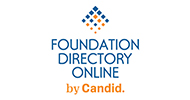Private foundations are an important source of support for academic research. Below are some resources to help you find funding opportunities from foundations.
Foundation Search Tools

Foundation Directory: The Directory provides information about U.S. private and public foundations, including organization profiles, links to foundation websites, and funding opportunities. Users can subscribe to the "Philanthropy News Digest" to receive timely updates about new funding opportunities. Access to the Foundation Directory is provided by the Cornell University Library.

Grant Forward: A searchable database of grants from over 14,000 sponsors, including foundations. Search by keywords and advanced filters. Save your favorite searches to receive alerts about new grants, and save your favorite grants to keep track of them. GrantForward also recommends grants to you based on your CV, past publications, and research interests.
- Cornell University subscribes to GrantForward. Faculty, students and staff with a Cornell netID have free full access. Sign up here using your cornell.edu email.
- Updated daily with new funding opportunities from diverse disciplines, including in the Life and Physical Sciences, Social Sciences, and Arts and Humanities.
- Learn how to make GrantForward work for you: Click here to access the March 2024 webinar "Using GrantForward as a Grant Seeker". Review QuickTips and the Researcher Welcome Guide.
The Science Philanthropy Alliance provides overviews of areas of interest, approaches, and funding opportunities from several of its member organizations (such as the Sloan Foundation, Burroughs Wellcome Fund, and more). Visit the Alliance Member Priorities webpage.
If you plan to apply to a foundation for funding, contact your Grant and Contract Officer and ask if the foundation's terms and conditions conform to Cornell's policies.
Top Foundation Funders at Cornell
- American Cancer Society
- American Chemical Society
- American Heart Association
- American Kennel Club - Canine health
- Ford Foundation
- Gates Foundation Grand Challenges and General Grant Opportunities
- Jacobs Foundation Fellowships - Child and youth development
- MacArthur Foundation
- Morris Animal Foundation (Grants and Veterinarians & Students) – Veterinary Medicine
- Robert Wood Johnson Foundation - Building a culture of health
- Russell Sage Foundation - Social Science research
- Simons Foundation - Basic Science and Mathematics
- Sloan Foundation - Research and education in STEM and economics
- Spencer Foundation - Improving education around the world
- Winn Foundation - Feline health
- William T. Grant Foundation - Improving the lives of young people in the U.S.
- Research and make the right fit.
- One of the most common reasons applications are rejected is not fitting with the funder's interests, goals, and priorities.
- Tailor your proposal to the specific funder's guidelines and interests.
- Funders really want to know:
- How will they benefit from investing in your research program? How will it help them achieve their goals?
- Why should they care? (The "so what?" factor.)
- Why are you the best one to do the work?
- How will you sustain the work after the funds are gone?
- Write an Executive Summary.
- Even if it's not required by a funder, an Executive Summary is good to have on-hand to share with potential funders and program managers. It should be clear and concise, and grab the reader's attention immediately.


